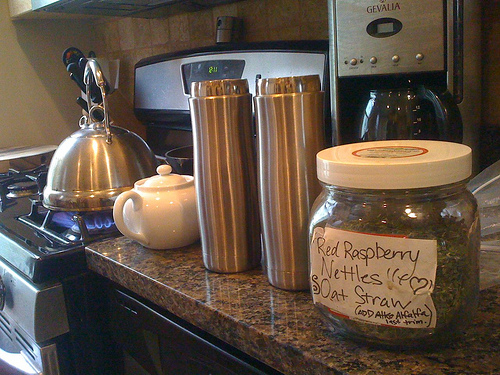If you’re pregnant or breastfeeding, the rules of herbal safety change. Herbs that were safe weeks ago may not be safe when you find out that you’re pregnant. Some herbs are definitely unsafe, while many others lack good scientific research proving their safety, which includes herbs that have been used for thousands of years to address basic pregnancy complaints or as pregnancy tonics. However, there are also wonderful herbs to use that we know are safe. How do we know which is which? First, a few ground rules.
Rule 1: Play it safe with all medications It's worth being conservative with all medicines, whether pharmaceutical or herbal. The vast majority of both have not been tested for pregnancy, in part because of interest and resources, and in part due to the ethics of safety testing on pregnant women. The thalidomide disaster of the 1960s--when a drug prescribed for nausea and vomiting during pregnancy resulted in thousands upon thousands of severely malformed infants--tells us that we should be cautious even with pharmaceuticals that are considered "safe," and certainly, few medications come without risk.
Thankfully, most herbs are safe, particularly in low doses when used for brief periods. However, as pregnant women, we need better than "probably." Here are some useful resources to find out whether an herb is contraindicated during pregnancy:
- The Essential Guide to Herbal Safety and see the monograph section of Principles and Practice of Phytotherapy, both by Kerry Bone and Simon Mills.
Rule 2: Avoid long-term use of herbs in the first trimester The first trimester is the time when your baby is developing its major organ systems and is most sensitive to influences that can negatively impact this delicate process. While using herbs to address pregnancy complaints, chief among them nausea and vomiting, is helpful in and of itself, and in avoiding more costly or potentially harmful medications, the long-term use of tonic herbs is not recommended. Nor should you use alcohol-based tinctures during the first trimester; boil off the alcohol, or go for teas or capsules instead.
Rule 3: Source your herbs from reputable businesses Commercial pregnancy teas are fine, but I prefer not to use them as I find they're costly, I can't really control the dosage, and I don't know how long they've been sitting on the shelf (plus, storing herbs in paper boxes isn't great for potency). Buying bulk herbs cuts down on the cost, but the quality can vastly differ from source to source. Unscrupulous businesses may mix other herbs as filler without labeling them, or the herb might be contaminated depending on how it was stored or processed.
Buying international products is generally not a good idea. It's hard to control for things like adulteration or contamination, but also, what we assume herbalism to be may be different in other countries. In China, for example, Traditional Chinese Medicine is used hand-in-hand with modern medicine, so herbal products may sometimes be mixed with pharmaceuticals which are not always listed on the label. South Asian Ayurvedic medicine sometimes uses heavy metals as part of their therapeutic treatment, which hasn't been shown to be safe. A 2004 study showed that one in five Ayurvedic products available in Boston was mixed with heavy metals like arsenic and lead.
The best practice is to purchase organic herbs from businesses that:
- Clearly state their business practices, which might include a statement of ethics (ethical growth or harvesting).
- Have a return policy if what you receive isn't what you expected.
- State what part of the herb was harvested, and at what time of the year.
Some of my favorites for bulk herbs are Mountain Rose Herbs and Jean's Greens.
Rule 4: Work with an herbalist or naturopath If you can find a midwife with herbalism training, then that would be fantastic, and they are out there. In lieu of a pregnancy specialist, work with an herbalist or naturopath who has experience treating pregnancy complaints. If you're just feeling nauseous, then you can follow recommendations in sources like The Natural Pregnancy Book, but if you're someone with a more complex health history, then working closely with a practitioner who understands how all the pieces fit together in addition to knowledge of herbal safety is a much safer option than treating yourself.
Rule 5: Disclose all medications, both herbal and pharmaceutical, to all relevant care providers This rule applies to everyone using any form of medicine but especially herbs and supplements because they are so frequently under-reported to care providers. Drug-drug interactions are a common reason for an emergency room visit or hospitalization; while herb-drug interactions tend to be less dangerous overall, they can cause also cause serious problems. The pregnancy herbs I work with are pretty benign, but I still feel that complete disclosure is an important principle in caring for our health.
Rule 6: Pay attention to how you feel Even safe herbs can cause rare unusual reactions for some people. For example, those with allergies to ragweed might find that they respond similarly to chamomile. If you feel that an herb is not right for you, discontinue its use.
Ok, got it? Now on to my favorite herbs for pregnancy.
If you're interested in further reading, check out:
- Tieraona Low Dog, MD, "The Use of Botanicals During Pregnancy and Lactation"
- Aviva Romm, MD, "Herbs for the Mom-to-be"
- Timothy Johns and Linda Sibeko, "Pregnancy outcomes in women using herbal therapies"

